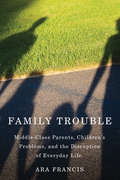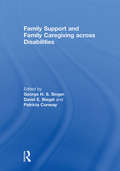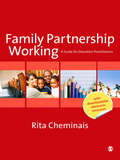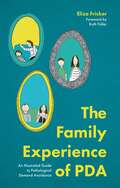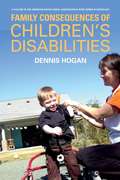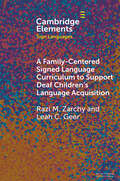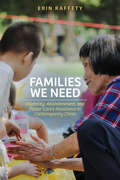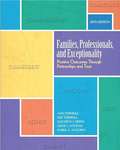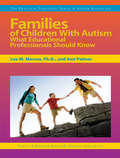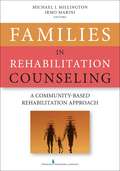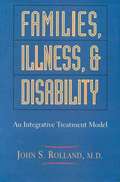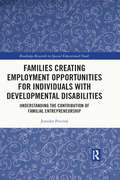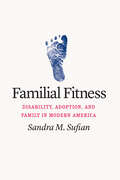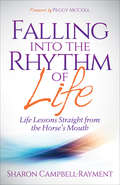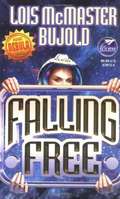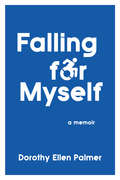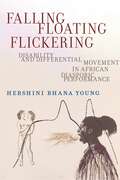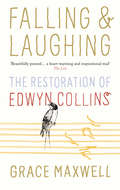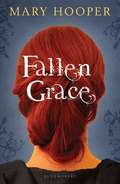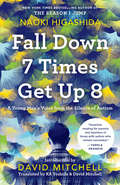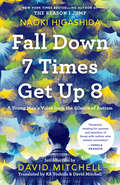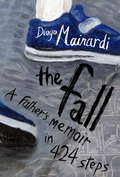- Table View
- List View
Family Trouble
by Ara FrancisOur children mean the world to us. They are so central to our hopes and dreams that we will do almost anything to keep them healthy, happy, and safe. What happens, then, when a child has serious problems? In Family Trouble, a compelling portrait of upheaval in family life, sociologist Ara Francis tells the stories of middle-class men and women whose children face significant medical, psychological, and social challenges. Francis interviewed the mothers and fathers of children with such problems as depression, bi-polar disorder, autism, learning disabilities, drug addiction, alcoholism, fetal alcohol syndrome, and cerebral palsy. Children's problems, she finds, profoundly upset the foundations of parents' everyday lives, overturning taken-for-granted expectations, daily routines, and personal relationships. Indeed, these problems initiated a chain of disruption that moved through parents' lives in domino-like fashion, culminating in a crisis characterized by uncertainty, loneliness, guilt, grief, and anxiety. Francis looks at how mothers and fathers often differ in their interpretation of a child's condition, discusses the gendered nature of child rearing, and describes how parents struggle to find effective treatments and to successfully navigate medical and educational bureaucracies. But above all, Family Trouble examines how children's problems disrupt middle-class dreams of the "normal" family. It captures how children's problems "radiate" and spill over into other areas of parents' lives, wreaking havoc even on their identities, leading them to reevaluate deeply held assumptions about their own sense of self and what it means to achieve the good life. Engagingly written, Family Trouble offers insight to professionals and solace to parents. The book offers a clear message to anyone in the throes of family trouble: you are in good company, and you are not as different as you might feel...
Family Support and Family Caregiving across Disabilities
by George H. S. Singer David E. Biegel Patricia ConwayFamily members provide the majority of care for individuals with disabilities in the United States. Recognition is growing that family caregiving deserves and may require societal support, and evidence-based practices have been established for reducing stress associated with caregiving. Despite the substantial research literature on family support that has developed, researchers, advocates and professionals have often worked in separate categorical domains such as family support for caregiving for the frail elderly, for individuals with mental illness, or for people with development disabilities. Family Support and Family Caregiving across Disabilities addresses this significant limitation through cross-categorical and lifespan analyses of family support and family caregiving from the perspectives of theory and conceptual frameworks, empirical research, and frameworks and recommendations for improvements in public policy. The book also examines children with disabilities, children with autism, adults with schizophrenia, and individuals with cancer across the life cycle. This book was published as a two-part special issue in the Journal of Family Social Work.
Family Policy and Disability
by Arie RimmermanThis book explores the status and scope of family policies related to households of children with disabilities, providing an in-depth, evidence-based review of legal, programmatic issues. It includes a discussion of the gaps between family needs and contemporary family policies in the United States and European countries, as demonstrated in these households' surveys. In addition, the volume offers a comparative analysis of cash benefits, tax credits and deductions, and in-kind provisions between the United States and select European countries (UK, France, and Sweden). Most importantly, this book identifies and continues the discussion regarding the critical role of family-centered policies, as expressed in the United Nations Convention on the Rights of Persons with Disabilities (UNCRPD), as well as the future of family policy toward families of children with disabilities at a time of economic crisis.
Family Partnership Working: A Guide for Education Practitioners
by Rita CheminaisImproving the quality and effectiveness of relationships with families is a key concern for all those working in education. Here, Rita Cheminais provides an evaluation framework that will enable practitioners to review current practice, and further enhance and develop their partnership working with families. Six key themes of family partnership working are explored: - ethos, vision and policy - leadership, management and co-ordination - communication and information sharing - partnership in practice - early intervention - effectiveness. Guidance on auditing your own work and action planning is included, and the book provides a range of practical resources which are available to download from the SAGE website. This a vital handbook for those working with the Birth to 19 age range in Children's Centres, primary and secondary schools, special schools, academies, Pupil Referral Units and Further Education colleges.
Family Interventions Throughout Chronic Illness and Disability
by Paul W. Power Martha Blechar Gibbons Arthur E. Dell OrtoTextbook covering a wide range of disabilities and chronic illnesses. Intended for health, allied health, and other helping professionals.
The Family Experience of PDA: An Illustrated Guide to Pathological Demand Avoidance
by Eliza FrickerEliza Fricker gets it. Describing her perfectly imperfect experience of raising a PDA child, with societal judgements and internal pressures, it is easy to feel overwhelmed, resentful and alone. This book's comedic illustrations explain these challenging situations and feelings in a way that words simply cannot, will bring some much-needed levity back into PDA parenting. Humorous anecdotes with a compassionate tone remind parents that they are not alone, and they're doing a great job. If children are safe, happy, and you leave the house on time, who cares about some smelly socks? A light-hearted and digestible guide to being a PDA parent covering everything from tolerance levels, relationships and meltdowns to collaboration, flexibility, and self care to dip in and out as your schedule allows to help get to grips with this complex condition. This book is an essential read for any parent with a PDA child, to help better understand your child, build support systems and carve out some essential self care time guilt free.
Family Consequences of Children’s Disabilities
by Denis P. HoganThe Americans with Disabilities Act (ADA) and other national policies are designed to ensure the greatest possible inclusion of people with disabilities in all aspects of American life. But as a matter of national policy we still place the lion's share of responsibility for raising children with disabilities on their families. While this strategy largely works, sociologist Dennis Hogan maintains, the reality is that family financial security, the parents' relationship, and the needs of other children in the home all can be stretched to the limit. In Family Consequences of Children's Disabilities Hogan delves inside the experiences of these families and examines the financial and emotional costs of raising a child with a disability. The book examines the challenges families of children with disabilities encounter and how these challenges impact family life. The first comprehensive account of the families of children with disabilities, Family Consequences of Children's Disabilities employs data culled from seven national surveys and interviews with twenty-four mothers of children with disabilities, asking them questions about their family life, social supports, and how other children in the home were faring. Not surprisingly, Hogan finds that couples who are together when their child is born have a higher likelihood of divorcing than other parents do. The potential for financial insecurity contributes to this anxiety, especially as many parents must strike a careful balance between employment and caregiving. Mothers are less likely to have paid employment, and the financial burden on single parents can be devastating. One-third of children with disabilities live in single-parent households, and nearly 30 percent of families raising a child with a disability live in poverty. Because of the high levels of stress these families incur, support networks are crucial. Grandparents are often a source of support. Siblings can also assist with personal care and, consequently, tend to develop more helpful attitudes, be more inclusive of others, and be more tolerant. But these siblings are at risk for their own health problems: they are three times more likely to experience poor health than children in homes where there is no child with a disability. Yet this book also shows that raising a child with a disability includes unexpected rewards—the families tend to be closer, and they engage in more shared activities such as games, television, and meals. Family Consequences of Children's Disabilities offers access to a world many never see or prefer to ignore. The book provides vital information on effective treatment, rehabilitation, and enablement to medical professionals, educators, social workers, and lawmakers. This compelling book demonstrates that every mirror has two faces: raising a child with a disability can be difficult, but it can also offer expanded understanding. A Volume in the American Sociological Association's Rose Series in Sociology
A Family-Centered Signed Language Curriculum to Support Deaf Children's Language Acquisition (Elements in Sign Languages)
by Razi M. Zarchy Leah C. GeerDeaf children experience language deprivation at alarmingly high rates. One contributing factor is that most are born to non-signing hearing parents who face insurmountable barriers to learning a signed language. This Element presents a case for developing signed language curricula for hearing families with deaf children that are family-centered and focus on child-directed language. Core vocabulary, functional sentences, and facilitative language techniques centered around common daily routines allow families to apply what they learn immediately. Additionally, Deaf Community Cultural Wealth (DCCW) lessons build families' capacity to navigate the new terrain of raising a deaf child. If early intervention programs serving the families of young deaf children incorporate this type of curriculum into their service delivery, survey data suggest that it is both effective and approachable for this target population, so the rates of language deprivation may decline.
Families We Need: Disability, Abandonment, and Foster Care’s Resistance in Contemporary China
by Erin RaffetySet in the remote, mountainous Guangxi Autonomous Region and based on ethnographic fieldwork, Families We Need traces the movement of three Chinese foster children, Dengrong, Pei Pei, and Meili, from the state orphanage into the humble, foster homes of Auntie Li, Auntie Ma, and Auntie Huang. Traversing the geography of Guangxi, from the modern capital Nanning where Pei Pei and Meili reside, to the small farming village several hours away where Dengrong is placed, this ethnography details the hardships of social abandonment for disabled children and disenfranchised, older women in China, while also analyzing the state’s efforts to cope with such marginal populations and incorporate them into China’s modern future. The book argues that Chinese foster families perform necessary, invisible service to the Chinese state and intercountry adoption, yet the bonds they form also resist such forces, exposing the inequalities, privilege, and ableism at the heart of global family making.
Families, Professionals, and Exceptionality: Positive Outcomes Through Partnerships and Trust
by Ann Turnbull H. Rutherford Turnbull Elizabeth J. Erwin Leslie C. Soodak Karrie A. ShogrenThe best-known authors in the field of family and professional collaboration, this practical text instructs teachers, education professionals, and families on how to empower, collaborate, and advocate for children with special needs and how everyone involved can form lasting partnerships for the betterment of the children they live for and serve. The book has always been strong in its depiction of family systems theory, the history and current status of policy, and the principles of partnership and their application by teachers and other professionals, as well as the plethora of practical advice given to help educators find true ways to apply these principles on the job. The inclusion of authentic stories and genuine depictions of special needs people and their families only deepens the authenticity and richness of the narrative, and adds a unique and touching human element to the subject at hand. Backed by the most recent research and evidence-based practices, the authors have brought all citations and references in this edition up to date (2009). This new edition features: more families and their unique stories, including a Marine Corps family, and a single-parent family; more coverage of secondary students, and an overall broader range of disabilities; more cultural diversity and examples of families from different ethnic backgrounds; and the book now portrays a family's entire lifespan.
Families of Children With Autism: What Educational Professionals Should Know
by Lee M. Marcus Ann PalmerThis text provides an overview of the role of educational professionals in the lives of families of children with autism.
Families In Rehabilitation Counseling: A Community-Based Rehabilitation Approach
by Irmo Marini Michael J. MillingtonPresents an innovative family-based approach to rehabilitation counseling that can be put to use immediately While the family has traditionally been a secondary consideration in rehabilitation, this graduate text presents an innovative approach to rehabilitation counseling that focuses on the family as the center of a person-centered model, rather than as an adjunct to individual counseling. It advocates counseling in the context of community, requiring the recognition of social transaction as the primary focus of all interventions. The book provides the tools and knowledge base to effectively work with the family and within the community, delivering a new inclusive model of care and establishing best practices in research, practice, training, and management. The text examines the rationale for embracing family values in rehabilitation counseling and provides a framework that redefines the relationship between counselor and client in the context of family and community. It describes the community-based rehabilitation model in detail according to the International Classification of Function (ICF).
Families, Illness, and Disability: An Integrative Treatment Model
by John S. RollandWhen a family member is diagnosed with cancer or faces challenges from living with a disability, the impact reverberates throughout the family, leaving no one untouched. How should a clinician help the parents of a child who is critically ill? How can a marital relationship be skewed and a child's well-being compromised when a parent becomes permanently disabled-and how can a clinician best intervene in such cases? In presenting his clinically powerful Family Systems Illness Model, John Rolland addresses these and other vital questions of importance to families in which there is a member with a major illness or disability. Rolland's integrative treatment model is based on his experience with more than five hundred families, first as Founding Director of the Center for Illness in Families while at Yale University and currently at the University of Chicago. He applies it to a broad range of disorders that affect adults and children over the entire course of the life cycle. Richly illustrated with varied case examples, Families, Illness, and Disability is unique in describing this comprehensive model and in providing a highly practical guide to effective intervention. Through a normative, preventive lens, the book's useful framework shows how the biopsychosocial demands of different illness and disabilities create particular strains on the family, how the stages of an illness affect the family, how family legacies of loss and illness shape their coping responses, and how family belief systems play a crucial role in the ability to manage health and illness. Practitioners will learn how to help families live well despite physical limitations and the uncertainties of threatened loss, how to encourage empowering rather than shame-based illness narratives, how to rewrite rigid caregiving scripts, how to encourage intimacy and maximize autonomy for all family members. With its superb integration of individual and family modalities, this outstanding book is ideal for all health and mental health professionals and students who work with illness, disability, and loss in a wide variety of clinical settings.
Families Creating Employment Opportunities for Individuals with Developmental Disabilities: Understanding the Contribution of Familial Entrepreneurship (Routledge Research in Special Educational Needs)
by Jennifer PercivalThis volume provides an in-depth, qualitative exploration of familial entrepreneurship as an innovative employment model, being established by families in response to difficulties faced by individuals with developmental disabilities in entering the labor market. Drawing on rich qualitative data collected via research with families, this volume explores how and why familial entrepreneurs in the United States have chosen to develop businesses to employ their loved ones. Chapters offer close analysis of the challenges and opportunities associated with familial entrepreneurship and highlight the ways in which this practice supports people with developmental disabilities by providing opportunities for skill development, social interaction, and participation in meaningful activity. Recognizing familial entrepreneurship as a new and distinct hybrid employment model, the text goes on to consider how curricula, policy, and state services might better support families and underpin this form of inclusive work. The volume provides important conclusions that contribute to the fields of Disability Studies, Entrepreneurship, Inclusive Education, Adult Education, Exceptional Student Education, Transition, and Vocational Rehabilitation. It is a key reading for scholars in these fields and across Education more widely.
Familial Fitness: Disability, Adoption, and Family in Modern America
by Sandra M. SufianThe first social history of disability and difference in American adoption, from the Progressive Era to the end of the twentieth century. Disability and child welfare, together and apart, are major concerns in American society. Today, about 125,000 children in foster care are eligible and waiting for adoption, and while many children wait more than two years to be adopted, children with disabilities wait even longer. In Familial Fitness, Sandra M. Sufian uncovers how disability operates as a fundamental category in the making of the American family, tracing major shifts in policy, practice, and attitudes about the adoptability of disabled children over the course of the twentieth century. Chronicling the long, complex history of disability, Familial Fitness explores how notions and practices of adoption have—and haven’t—accommodated disability, and how the language of risk enters into that complicated relationship. We see how the field of adoption moved from widely excluding children with disabilities in the early twentieth century to partially including them at its close. As Sufian traces this historical process, she examines the forces that shaped, and continue to shape, access to the social institution of family and invites readers to rethink the meaning of family itself.
Falling into the Rhythm of Life: Life Lessons Straight from the Horse's Mouth
by Sharon Campbell-RaymentIn every tragedy there is the ability to heal and rise above the challenge. In Falling into the Rhythm of Life, author Sharon Campbell-Rayment leads readers through her personal story of a devastating accident and her path to healing and recovery. She also provides readers with helpful lessons, tips and techniques called – Life Lessons Straight From the Horse's Mouth – written to equip readers on their own journeys.
Falling into Life
by Leonard KriegelLeonard Kriegel writes essays about his struggles with being a man and having polio.
Falling Free (Miles Vorkosigan #4)
by Lois Mcmaster BujoldDisability politics in space. Disability politics in outer space. Same setting as the Vorkosigan Saga, but set approximately 200 years before Miles is born.<P><P> Leo Graf was an effective engineer ...Safety Regs weren't just the rule book he swore by; he'd helped write them. All that changed on his assignment to the Cay Habitat. Leo was profoundly uneasy with the corporation exploitation of his bright new students - - 'till that exploitation turned to something much worse. He hadn't anticipated a situation where the right thing to do was neither safe, nor in the rules... Leo Graf adopted 1000 quaddies -- now all he had to do was teach them to be free.<P> Nebula Award winner.
Falling for Myself
by Dorothy Ellen PalmerIn this searing and seriously funny memoir, Dorothy Ellen Palmer falls down, a lot, and spends a lifetime learning to appreciate her disability. Born with two very different, very tiny feet, she was adopted as a toddler by an already wounded 1950s family. From childhood surgeries to decades as a feminist teacher, mom, improv coach and unionist, she tried to hide being different. But now, standing proud with her walker, she's sharing her journey. Navigating abandonment, abuse and ableism, she finds her birth parents and a new chosen family in the disability community.
Falling, Floating, Flickering: Disability and Differential Movement in African Diasporic Performance (Crip #7)
by Hershini Bhana YoungInsists on the importance of embodiment and movement to the creation of Black socialityLinking African diasporic performance, disability studies, and movement studies, Falling, Floating, Flickering approaches disability transnationally by centering Black, African, and diasporic experiences. By eschewing capital’s weighted calculus of which bodies hold value, this book centers alternate morphologies and movement practices that have previously been dismissed as abnormal or unrecognizable. To move beyond binaries of ability, Hershini Bhana Young traverses multiple geohistories and cultural forms stretching from the United States and the Mediterranean to Sierra Leone, Nigeria, and South Africa, as well as independent and experimental film, novels, sculptures, images, dance, performances, and anecdotes. In doing so, she argues for the importance of differential embodiment and movement to the creation and survival of Black sociality, and refutes stereotypic notions of Africa as less progressive than the West in recognizing the rights of disabled people. Ultimately, this book foregrounds the engagement of diasporic Africans, who are still reeling from the violence of colonialism, slavery, poverty, and war, as they gesture toward a liberatory Black sociality by falling, floating, and flickering.
Falling and Laughing: The Restoration of Edwyn Collins
by Grace MaxwellIn February 2005, Edwyn Collins suffered two devastating brain haemorrhages. He should have died. Doctors advised that if he did survive, there would be little of him left. If that wasn't enough, he went on to contract MRSA as a result of an operation to his skull and spent six months in hospital. Initially, Edwyn couldn't speak, read, write, walk, sit up or feed himself. He had lost all movement in his right side and was suffering from aphasia - an inability to use or understand language. When he initially recovered consciousness the only words he could say were 'Grace', 'Maxwell', 'yes' and 'no'.But with the help of his partner Grace and their son Will, Edwyn fought back. Slowly, and with monumental effort, he began to teach his brain to read and speak all over again - with some areas of his mind it was if he had been a slate wiped utterly clean. Through a long and arduous road of therapy he began to re-inhabit his body until he could walk again. Grace's story is an intimate and inspiring account of what you do to survive when your husband is all but taken away without warning by a stroke.
Fallen Grace
by Mary HooperLife has been nothing but unfair to Grace Parkes and her sister. Penniless, the two orphans manage to stay alive-but only barely, like so many on the streets of Victorian London. And Grace must bear a greater heartbreak, having become pregnant from terrible circumstances and then given birth to a stillborn baby. But the infant's death sets Grace on a new path, bringing her into contact with people who hold both riches and power. A great fraud has been perpetrated on young Grace and her sister, and they are the secret recipients of a most unusual legacy-if only they can find the means to claim it. Mary Hooper's latest offers Dickensian social commentary, as well as malicious fraud, mysterious secrets, and a riveting read.
Fall Down 7 Times Get Up 8: A Young Man's Voice from the Silence of Autism
by David Mitchell Naoki Higashida Ka YoshidaFrom the author of the bestselling The Reason I Jump, an extraordinary self-portrait of life as a young adult with autism Naoki Higashida was only thirteen when he wrote The Reason I Jump, a revelatory account of autism from the inside by a nonverbal Japanese child, which became an international success. Now he shares his thoughts and experiences as a twenty-four-year-old man living each day with severe autism. In short, powerful chapters, Higashida explores school memories, family relationships, the exhilaration of travel, and the difficulties of speech. He also allows readers to experience profound moments we take for granted, like the thought-steps necessary for him to register that it’s raining outside. Acutely aware of how strange his behavior can appear to others, he aims throughout to foster a better understanding of autism and to encourage society to see people with disabilities as people, not as problems. With an introduction by bestselling novelist David Mitchell, Fall Down 7 Times Get Up 8 also includes a dreamlike short story Higashida wrote especially for this edition. Both moving and of practical use, this book opens a window into the mind of an inspiring young man who meets every challenge with tenacity and good humor. However often he falls down, he always gets back up.Advance praise for Fall Down 7 Times Get Up 8“Vibrant . . . In Mitchell and Yoshida’s deft translation, Higashida conveys this isolating mindset and his yearnings for connection and self-expression, in direct, evocative prose—his compulsive, restless motion, he writes, is ‘instinctual, like a wild animal running over a wide plain’—that provides readers with a window into a previously unknowable world.”—Publishers Weekly “Illuminating . . . Autism is a mysterious neurological condition. . . . Higashida gives us a thoughtful view of the art of living well in its shadow.”—Kirkus Reviews “Readers will find this older Higashida not only eloquent and thoughtful, but also wise, measured and, most of all, kind.”—BookPage“This book is essential reading for parents and teachers of those with autism who remain nonverbal.”—Temple Grandin, author of The Autistic Brain and Thinking in Pictures“Compelling insight on every single page, gently challenging assumptions you didn’t even know you held on how others ‘should’ process the social and physical environments around us.”—Ellen Notbohm, author of Ten Things Every Child with Autism Wishes You Knew
Fall Down 7 Times Get Up 8: A Young Man's Voice from the Silence of Autism
by David Mitchell Ka Yoshida Naoki HigashidaA story never before told and a memoir to help change our understanding of the world around us, 13-year-old Naoki Higashida's astonishing, empathetic book takes us into the mind of a boy with severe autism. With an introduction by David Mitchell, author of the global phenomenon, Cloud Atlas, and translated by his wife, KA Yoshida.Naoki Higashida was only a middle-schooler when he began to write The Reason I Jump. Autistic and with very low verbal fluency, Naoki used an alphabet grid to painstakingly spell out his answers to the questions he imagines others most often wonder about him: why do you talk so loud? Is it true you hate being touched? Would you like to be normal? The result is an inspiring, attitude-transforming book that will be embraced by anyone interested in understanding their fellow human beings, and by parents, caregivers, teachers, and friends of autistic children. Naoki examines issues as diverse and complex as self-harm, perceptions of time and beauty, and the challenges of communication, and in doing so, discredits the popular belief that autistic people are anti-social loners who lack empathy. This book is mesmerizing proof that inside an autistic body is a mind as subtle, curious, and caring as anyone else's.
The Fall
by Diogo Mainardi Margaret Jull CostaTHE FALL is a memoir like no other. Its 424 short passages match the number of steps taken by Diogo Mainardi's son Tito as he walks, with great difficulty, alongside his father through the streets of Venice, the city where a medical mishap during Tito's birth left him with Cerebral Palsy. As they make their way toward the hospital where both their lives changed forever, Mainairdi begins to draw on his knowledge of art and history, seeking to better explain a tragedy that was entirely avoidable. From Marcel Proust to Neil Young, to Sigmund Freud to Humpty Dumpty, to Renaissance Venice and Auschwitz, he charts the trajectory of the Western world, with Tito at its center, showing how his fate has been shaped by the past. Told with disarming simplicity; by turns angry, joyful, and always generous, wise and suprising, THE FALL is an anstonishing book.
